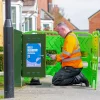Openreach Trial Limited UK FTTP Broadband Migration Discount
Openreach is to trial a special discount for their consumer friendly Fibre-to-the-Premises (FTTP) ultrafast broadband ISP tiers, which will enable providers in certain specific “Fibre First” exchange areas to offer free connections and cheaper rental so as to test or encourage migrations to “full fibre” lines.
The trial will only take place in four exchange areas – Cardiff (Whitchurch), Edinburgh (Corstorphine), Liverpool (Childwall) and Manchester (Swinton) – and become available via supporting ISPs from 1st March 2019. After this the offer will remain open for 12 months, although the offer term will be for 24 months from the start of next month.
Under this promotion the wholesale FTTP rental will be reduced to just £15 +vat per month, which remains the same regardless of whether or not an end-user takes an entry-level 40/10Mbps tier or their top 330/50Mbps one. This applies to consumers looking to migrate (switch) to FTTP via a supporting ISP (at this stage it’s unclear if any providers will pass the savings on to end-users).
Advertisement
The official briefing note to ISPs is light on detail and warns that their prices are “limited to the trial only … they are not applicable outside trial exchange areas and are not reflective of future FTTP prices.” As ever the £15 price is a wholesale charge and doesn’t include all of the other elements that an ISP has to add in order to create the retail price (e.g. 20% VAT, profit margin, capacity, service features etc.).
Just for some comparison, the FTTP connection fee is usually £92 +vat (one-off) at wholesale and Openreach’s top 330Mbps (50Mbps upload) tier normally attracts a monthly rental of £29.61 for their “Transition product” (i.e. when provided alongside a phone service) or £38 for the data-only variant.
Mark is a professional technology writer, IT consultant and computer engineer from Dorset (England), he also founded ISPreview in 1999 and enjoys analysing the latest telecoms and broadband developments. Find me on X (Twitter), Mastodon, Facebook, BlueSky, Threads.net and Linkedin.
« Former Interoute Boss Appointed CEO of UK Full Fibre ISP Gigaclear
Three UK Launch 4G Home Broadband Plan with Unlimited Data »


















































Comments are closed